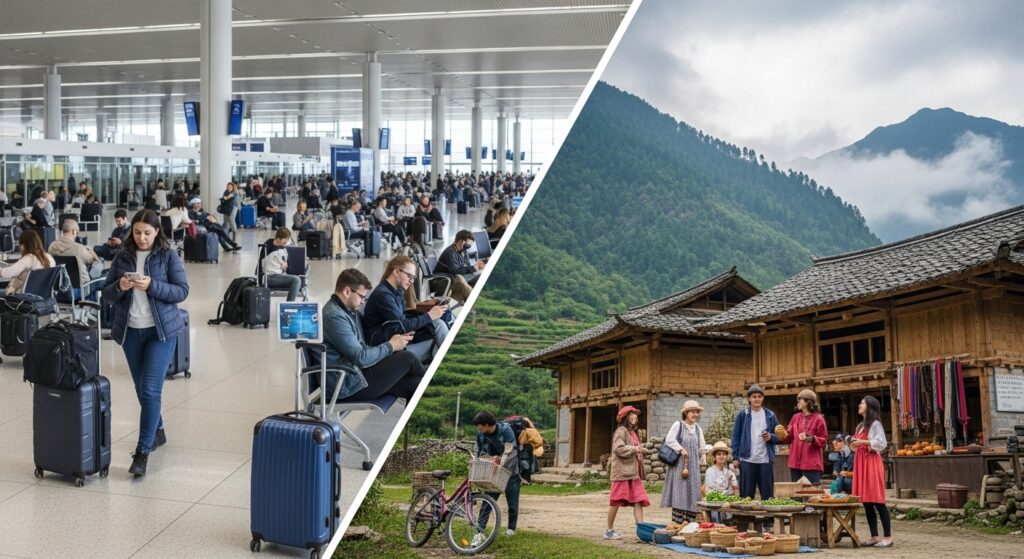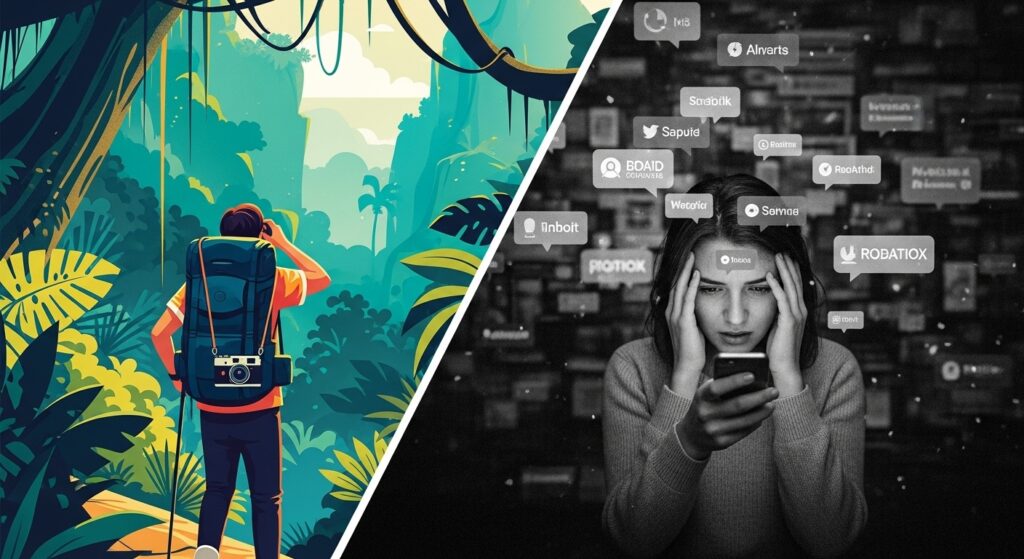Your phone buzzes with a Slack notification as you hike through Iceland’s moss-covered lava fields. Your Instagram feed fills with envy-inducing reels while you meditate in Bali. This is digital detox travel’s greatest contradiction: we seek escape from technology that simultaneously enables our adventures.
In 2025, 78% of travelers demand seamless online booking tools, yet 24% actively disconnect during vacations – a 300% increase from 2020. Nearly one-quarter now deliberately power down social media while traveling, signaling a mass awakening to technology’s psychological toll. The burning question isn’t whether we should detox, but whether it’s functionally possible when our lives are digitally interwoven.
“I paid $4,000 for a ‘screen-free’ Costa Rica retreat only to discover my elderly mother was hospitalized. Digital detoxes shouldn’t mean abandoning responsibility.” — Mark R., failed detox participant

The 2025 Detox Landscape: Beyond Luxury Retreats
Luxury’s Analog Revolution
High-end resorts now weaponize nostalgia against digital fatigue:
- Iceland’s Hotel Ranga offers “analog menus” with disposable cameras, folklore coloring books, and star charts for Northern Lights viewing
- San Diego’s Lakehouse Resort equips sailboats with binoculars, bird guides, and guitars instead of Spotify playlists
- Six Senses properties provide “sleep concierges” who confiscate devices and install sunset-synced circadian lighting
Budget-Friendly Unplugging
Detox travel democratized in 2025:
- Unplugged Cabins (UK): £120/night lockboxes for phones with emergency “dumbphones” provided (94% occupancy rate)
- National Park “Quiet Zones”: US Forest Service designates tech-free areas in 37 parks with Faraday cage shelters
- Library Tourism: Oslo’s Deichman Library offers $12 “disconnection pods” with typewriters and analog recording studios
Table: Digital Detox Options Across Budget Tiers
| Experience Type | Price/Night | Tech Allowances | Best For |
|---|---|---|---|
| Luxury Wellness Resort | $600-$1200 | Medical emergency tablet only | Deep neurological reset |
| Mid-Range Retreat | $200-$450 | Shared landline, film cameras | Weekend resets |
| Budget Cabin/Camping | $30-$150 | Emergency radio only | Minimalist travelers |
| Urban “Disconnection Pod” | $12-$50 | Typewriters, analog games | City dwellers |
The Practicality Test: 5 Real-World Challenges (and 2025 Solutions)
Challenge 1: I Can’t Abandon Work Completely
Solution: Structured Disconnection
- Batched Check-Ins: Use satellite messengers (Garmin inReach) for one daily 10-minute update window
- AI Work Shields: Apps like SaneBox filter 93% of non-urgent emails, sending only critical alerts via satellite
- Employer Contracts: Template agreements guaranteeing “response blackout periods” protected under EU right-to-disconnect laws
Challenge 2: I Need Digital Tools to Navigate
Solution: Analog Wayfinding Upgrades
- Tactile Maps: Raised topography trail maps for blind/low-vision travelers now mainstream at US national parks
- Audio Beacon Systems: Iceland’s volcanic zones install humming posts that guide hikers via sound frequencies
- Pre-Downloaded Knowledge: Oxford Press’s “Detox Travel Packs” include waterproof phrasebooks and star navigation primers
Challenge 3: My Family Needs Constant Contact
Solution: Layered Communication Protocols
- Emergency Hotlines: Retreat-provided landlines with scheduled call times
- Community Bulletin Boards: Physical message centers at detox resorts (e.g., “Jenna – meet at waterfall 3 PM”)
- Delayed Media Sharing: Disposable cameras developed post-trip for family slideshows

The Neuroscience Payoff: What 48 Hours Unplugged Actually Does
University of Zurich’s 2025 study tracked brain activity during digital detoxes:
- 72% increase in alpha waves (linked to creativity) after 48 hours
- 43% reduction in cortisol levels measured through sweat sensors
- 17-minute acceleration in sleep onset latency
“Participants reported ‘time dilation’ effects—feeling like a 3-day retreat lasted 2 weeks. Their brains weren’t fragmenting attention across apps, allowing deeper memory encoding.” — Dr. Lena Schmidt, Cognitive Neuroscientist
The Dark Side: When Detox Travel Harms Instead of Heals
Safety Failures
- A 2024 class-action lawsuit against “Pure Disconnect Retreats” after hikers got lost without GPS during wildfires
- Solution: FCC-mandated emergency satellite SOS buttons in all detox zones
Digital Rebound Effect
- 68% of detox participants binge >10 hours online immediately post-retreat
- Solution: “Phased Reintegration” programs with app blockers gradually increasing access
Privilege Blindness
- Only 12% of detox travelers are non-white; 80% earn >$75k/year
- Solution: Urban “Micro-Detox Centers” offering 3-hour slots for $15 in food deserts
Your 2025 Detox Toolkit: Curated by Duration and Budget
The Weekend Warrior Reset ($150)
- Friday 5 PM: Surrender devices at participating library lockers
- Saturday: Analog adventure pack rental (compass, foraging guide, watercolor set)
- Sunday: Guided “forest bathing” session with certified therapist
The Career Pause (7-10 Days)
- Pre-Detox: AI workflow audit identifying automatable tasks
- Detox Phase: Costa Rica’s “Monkey Vista” treehouse cluster with emergency radio only
- Reintegration: 3-day email triage training preventing inbox shock
The Family Digital Sabbatical
- Device Jar System: All phones in communal glass jar during meals/activities
- Analog Souvenirs: Collect pressed flowers instead of selfies; journal instead of blog
- Gamified Disconnection: Kids earn “explorer points” for identifying wildlife without apps
The Verdict: Yes, If You Embrace Nuance
Digital detox travel transforms from privileged fantasy to practical reality when:
- Emergency protocols replace absolute isolation
- Budget options democratize access
- “Maintenance micro-detoxes” integrate into daily life (e.g., morning screen-free hours)
The most successful 2025 detoxers aren’t Luddites – they’re technologists using tools like:
- Light Phone III: $299 minimal device with navigation, music, and texting (no browser)
- Rewire Neuroplasticity App: 12-minute daily exercises reducing phantom vibration syndrome
- Post-Detox Covenants: Family agreements like “No devices below treeline” during hikes
“I learned to sketch sunsets instead of photographing them. My camera roll is empty, but my wall has 12 framed memories that actually spark joy.” — Sofia K., 3-time detox alum

Final Reality Check: The goal isn’t permanent disconnection, but intentional engagement. As 2025’s top detox retreats prove, sometimes less tech means more travel.
Ready to Try? Start Small:
- Analog Sunday: Commit to 6 device-free hours this weekend
- Emergency Prep: Rent Garmin inReach Mini ($15/week)
- Book a Micro-Retreat: Try a 1-night Unplugged Cabin near you
The digital world will wait. Your capacity for wonder won’t.
